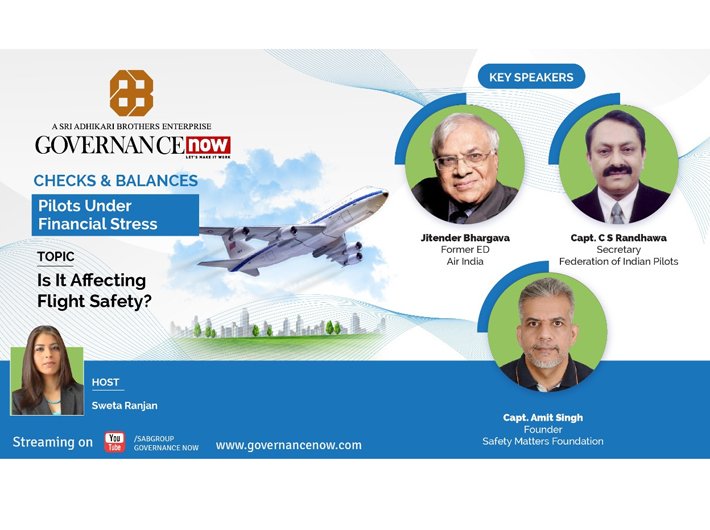The coronavirus fear seems almost over now, and many state governments have withdrawn most of the pandemic-related restrictions. Lives for almost all seem to be back on track, airlines are back to business in full strength, but the lives of Indian aviation pilots still seem derailed.
When the pandemic had impacted aviation, they had to suffer steep pay cuts, but even when the situation has normalized, their pays have not normalized. This makes the pilots a disgruntled lot. Be it Air India, the most popular IndiGo airlines, or budget airlines like SpiceJet or GoAir, a rebellion is brewing among pilots.
More than 200 of Air India pilots (that is, about 10% of the total) have expressed resentment towards the higher management for not rebounding the salary cut. They have written letters and made representations. In one of the letters, a pilot writes, “We the pilots of Air India have the honour to request you for an open house with your good self to enable us to discuss certain issues with you.” Similar letters have been sent to the department heads. The situation with most major airlines of the country is no different.
Pilots all across the airlines express their resentment but fear of losing their jobs bars them from coming to limelight and speaking publicly. A pilot at a budget airline says his salary currently is equivalent to what he was earning 10 years back at the beginning of his career. A pilot with a leading airline of the country says, “Initially we were hopeful. For pay cuts we didn't utter a word as the situation was grim everywhere. What is sad is that now even when companies are reporting profits they are paying no heed to the financial stress we are going through. People at higher positions are given bonuses but a line captain holds no importance in the eyes of the management.”
Today, as the pandemic seems almost over and air travel is back to full capacity, IndiGo has revived the salaries for ground staff, engineers and cabin crew, but the flight crew is still bearing losses. Once a national carrier, Air India has gone a step ahead. It has not rebound the salaries for any of its staff.
The latest edition of ‘Checks and Balances’, an online discussion with experts on governance challenges hosted by Sweta Ranjan, focuses on these demands of the aviation pilots.
Watch the episode here: https://www.youtube.com/watch?v=8tQc-MuMalw
Raising concerns over salary cuts, a pilot with GoAir says that their financial stress could even impact flight safety. He said, “In the cockpit, pilots are talking only about salary cuts. It is not humanly possible to keep the financial stress away from the cockpit. We are worried about our EMIs, children's school fees. We have been living under this stress for more than two years now.”
Let's hear what the expert panel has to say on this:
Federation of Indian Pilots secretary Captain C. S. Randhawa says, “The aviation industry has rebounded. From March 27, International flights have also been restored but many companies are not restoring the salaries of the pilots whereas it is very important that pilots should be stress free in the cockpit.”
Capt. Amit Singh, former head of training at IndiGo, and head of operations and safety, Airasia India, says, “The businessman will definitely see his profits but it doesn't mean he is doing any sort of favour to the employee by paying the salaries. In the beginning every company has to make a loss. From day one companies do not make profit but they cannot say that they will not make the payment. But what is committed should be paid. No one is doing any favour to the pilots. The salaries of the pilots have increased since 1999 due to market forces and competition, not because the airlines wanted to do any favour. If the companies make a commitment to pay a certain amount, they should pay. If the airlines are recovering after the pandemic, salaries should also recover.”
About the brewing resentment amongst the pilot fraternity, Capt Singh adds, “Companies should follow the principle of legitimacy. What we see happening in airline companies is that top management are paid hefty bonuses where pilots not heard. There should be uniformity and the principle of legitimacy should be applied to all. People should have a voice, they should be heard. Such situations arise only when the trust breaks down.”
But Jitender Bhargava, former executive director, Air India, says, “I am giving the example of IndiGo airline because amongst the Indian carriers it has been a profitable airline. The debate is that, because IndiGo is operating the same number of flights as the pre-Covid level, it should be considered normalcy and the old salary should be reinstated. The airline management has increased the salary by 8 percent and has promised to increase it further by 6 percent in the month of November, but it has not come back to normal. The mere number of operational flights does not bring profit to the company. Are they able to earn the same from the ticket fares? Is the revenue earned per kilometre passenger float the same as before? The answer is 'no'. This will further increase the competition when Akasa and Jet 2.0 start their operation. Airlines have fixed costs every month. Air fuel prices are sky high.”
Bhargava added, "I agree that if company doesn't pay full salary to the pilots but gives bonus or ESOPs (employee stock ownership plan (ESOP)) to the managemnet pilots, this is absolutely wrong."
